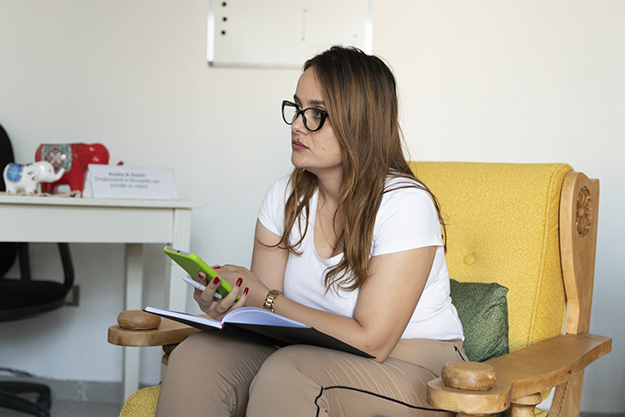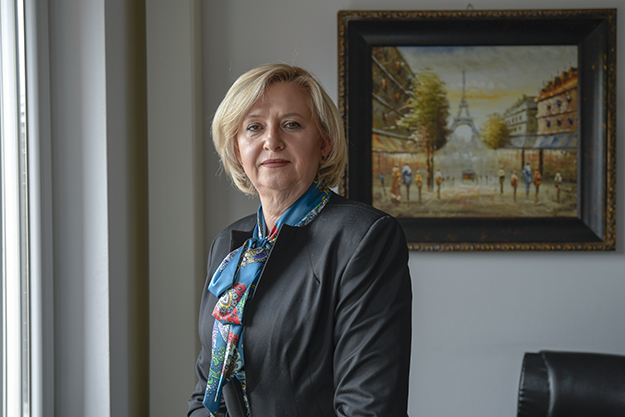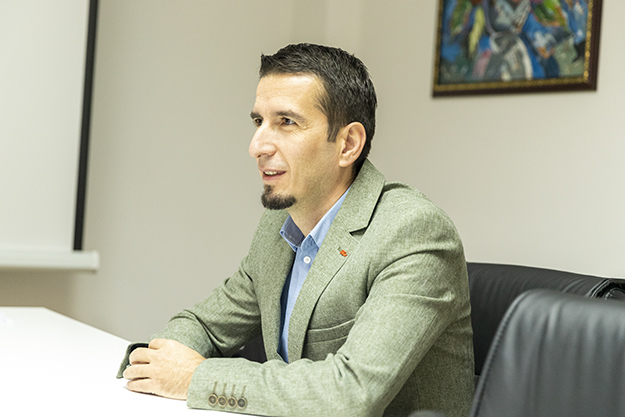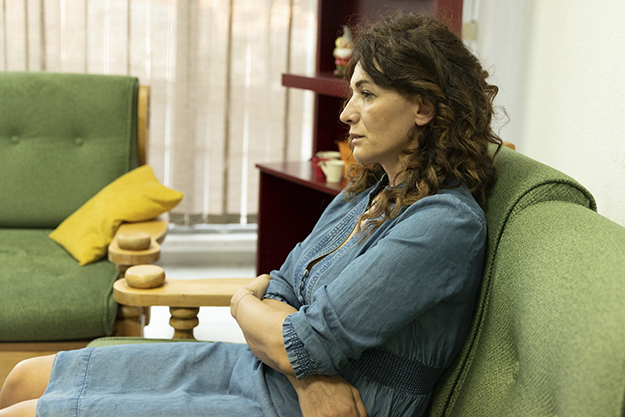After an ordinary 9-to-5 workday, Marigona Buja’s exhaustion can be heard in her voice. It’s in the frequent and long pauses she takes while connecting sentences, and it’s also in the way she is nestled in her yellow chair.
Buja and many other parents, mostly women, often gather at the Prishtina office of the Single Parent Association to share their divorce experiences as well as to learn more about the legal rights to which they are entitled.
Buja, who comes from the village of Bujan in Lipjan, works at an event organizing company in Kosovo’s capital. While working she leaves her 5-year-old daughter with her parents in Bujan, where they live together.
“It’s quite tough,” says Buja, 29, talking about the difficulties of covering the financial expenses for her daughter, who she raises on her own. “My daughter has been diagnosed with asthma. She takes medicine twice a day. I need to be very careful with her, and care for her. It’s very tough, especially now during the pandemic.”
After one year of marriage, Buja and her husband divorced in 2016. Since November of that year, when the Lipjan branch of the Basic Court of Prishtina decided on temporary alimony, she says that her ex-husband has not paid his obligations for their daughter. The court had initially assigned a payment of 250 euros but later reduced it to 150 euros. According to Buja, even after 2019 when the divorce was finalized and the court proceedings were over, her ex-husband avoided his obligation.

In spite of a court decision, Marigona Buja says she has never received alimony from her ex-husband — an experience shared by many single mothers. Photo: Uran Krasniqi.
“He never [paid the alimony]; not even one month,” Buja says. “We filed a complaint [with the court]. He also submitted a complaint that it was too much. It was reviewed and sent for retrial. They decided on alimony again, this time at 150 euros. He complained again. His complaint was refused and the alimony has been at 150 since November 2016.”
Arjeta Gashi, 43, from Prishtina has the same issue after divorcing her husband of 10 years. She finalized the divorce in 2013 when her only son was 10 years old.
“Since 2013, when the child’s father was obligated to pay alimony, he has never once made a payment,” says Gashi, who, motivated by her personal experience, founded the Single Parent Association in 2018 to push for the welfare of children of separated parents and the economic empowerment of single parents.
According to the Convention on the Rights of the Child, adopted by the United Nations, whose implementation in Kosovo is ensured through the Constitution, involved parties must take “all appropriate measures to ensure the receipt of alimony for the child by his parents or by other persons who have financial responsibilities toward them, whether inside or outside the country.”
The responsibility for this financial obligation is further clarified in the Family Law of Kosovo, which states that “a parent whose parental responsibility has been removed is not relieved of his duties to support their children.”
But in Kosovo, there are various reasons that contribute to the failure to pay this obligation. Among them is the inefficiency of the judicial system, including the postponement of such cases in courts, which do not consider these cases a priority. There are also shortcomings in the implementation of the law as well as problems that can arise between divorced couples in order to avoid obligations toward each other — and toward their childrens’ care.
Both Buja and Gashi have felt these consequences first hand.
A justiceless judicial system
Those who suffer from the lack of alimony are the children and the single parents, most of whom are mothers.
Data collected by K2.0 from the Kosovo Agency of Statistics shows that there were 3,637 divorces between 2010 and 2019 where couples had children. Of these, 2,188 children went into the custody of their mothers and 1,214 into the custody of their fathers. The two parents shared custody in 196 cases, while in 38 cases someone else received custody.
A 2014 scientific study analyzed the violation of children’s rights in relation to alimony in 30 divorce cases further found that the mother received custody in 24 cases while the father received custody in six. In total, there were only eight cases in which a parent was obliged to pay for alimony.
According to this study, court decisions for the payment of alimony were not implemented in some cases, while in others they encountered various obstacles.

Lawyer Merita Stublla-Emini blames the failure to legally protect single mothers on the inefficiency of the judicial system. Photo: Atdhe Mulla / K2.0.
According to lawyer Merita Stublla-Emini, who represents women in divorce proceedings, issues with alimony payments and the dysfunction of the institutional chain begin precisely with decisions taken by courts. She says that in some cases, they either do not apply the law, misinterpret it, or do not conduct sufficient investigations.
“Although Kosovo courts have a legal basis, they often do not pay added attention to correctly interpreting legal provisions and do not conduct investigations in order to decide correctly and adequately on the amount of alimony that would go toward a child’s welfare,” Stublla-Emini says.
The inefficiency of the courts to handle alimony cases has also been identified by the Ombudsperson, which specifically considers delays in court proceedings to decide on the allocation of alimony and their execution a violation of people’s rights.
“In some cases, the Ombudsperson concluded that there have also been violations of the right to a fair and impartial trial and has requested that the courts undertake all necessary actions in order for cases that are to do with children or children’s rights to be adjudicated on without delay and within legal deadlines,” the Ombudsperson said in a response to K2.0.
The National Audit Office, through a 2017 report on the efficiency of the management of civil cases in Kosovo’s basic courts, assessed that they are not being managed efficiently. It mentioned various issues, including the piling up of old cases, adjournments of court hearings and the high number of cases that are retried.
Regarding alimony cases specifically, according to Kosovo Judicial Council’s 2019 annual report that it sent to K2.0, 96 new cases were received in the courts last year, bringing the total number of cases on the books that year to 258. Of these, only 82 were resolved, while another 176 remained unresolved.
Buja has herself experienced the consequences of such delays.
“I attend 12 sessions and he [her ex-husband] does not come,” says Buja, whose ex-husband lives mostly in Germany. “He comes to Kosovo but does not come to court. He disregards the invitation, refuses to come and does not take responsibility. He answers for none of this.”
K2.0 has contacted two lawyers, Naser Gashi and Fehmi Shala, who represented Buja’s ex-husband, but neither would comment on the case since they no longer represent him.
Absence of the respondents is one of the common reasons why cases are delayed in court, where the ex-spouse’s lawyer is often absent. According to Gashi, this is a strategy by the respondent parent to delay the process, knowing that retroactive payment can be avoided, since after the court decides on alimony, parents are not obliged to pay for the months before the verdict.
Gashi says that failure to pay alimony retroactively exhausts custodial parents; mothers, in the majority of cases, end up accepting a very small sum just so the issue is resolved.
Yll Zekaj, a representative of the NGO Kosovo Law Institute (KLC), says that in addition to the duration of court proceedings, which can take years to reach a final verdict, another problem is the non-implementation of the Law on Mediation.
Under this law, alimony cases fall into the category of compulsory mediation cases — so, after the lawsuit is initiated, the judge starts the case through a mediation procedure where a licensed mediator, chosen and paid for by the parties themselves, attempts to resolve it. If this is not achieved within 90 days, the case is returned to the court for due process.
Zekaj says that although this law entered into force in 2018, judges often do not respect it and such cases are largely not even referred to the mediation procedure.
Another problem is the failure to execute court decisions on alimony; the court must ensure that the obligations arising from the judgment are fulfilled either voluntarily or by force.

Ylli Zekaj from the Kosovo Law Institute says that the Prosecution needs to be more proactive in taking legal action against those who flout court decisions on alimony payments. Photo: Uran Krasniqi.
In the Center for Free Legal Aid established by KLC, Zekaj says that there have been cases where although there was a final judgment determining alimony, the party who had benefited from this right had still not received payment five years after the judgment was issued.
“The law determines that the execution of decisions in cases of family relations is in the competence of the court and not private executors,” he says. “This has led to procedural delays in cases where alimony is not paid voluntarily and the [decision] should be processed through the execution procedure.”
Zekaj underlines that the failure to implement the Criminal Code is another problem, and says that the Prosecution should be proactive in taking legal action against those who disregard the court by not executing court decisions.
“From our monitoring practice, we have not encountered any case when criminal proceedings have been initiated in such cases,” he says.
Bedri Bahtiri, a lecturer in Family and Inheritance Law at the University of Prishtina, says that the court has sufficient authority to initiate investigations ex officio into a case where it is suspected that one parent is not fulfilling his or her obligations toward a child, which is a criminal offense according to the Criminal Code. However, according to Bahtiri, no case has been identified to date in which a civil court has notified the Prosecution regarding non-fulfillment of obligations related to alimony.
“This is left to the injured parties,” Bahtiri says. “In this case, the civil court should initiate criminal proceedings by notifying the State Prosecutor about this criminal offense, which would have a positive effect first in terms of prevention and then as a punitive measure against all of those who evade the legal obligation to pay alimony.”
The Kosovo Judicial Council has responsibility for monitoring and taking potential measures against courts when they do not perform their jobs properly, while the Prosecutorial Council has a similar role for prosecutors. But the 2017 National Audit Office report shows that the Judicial Council has not been effective in monitoring the progress of courts, as it has created generalized and vague measures that cannot be measured, complicating the monitoring process.
Among the problems with the courts highlighted in this report are the postponement and high number of cases that remain unresolved, the varied distribution of civil cases to judges, irregularities in the completion and specification of cases, delays in their review in the Court of Appeals, and the high number of cases that go on retrial at the basic courts.
But the report notes that monitoring of courts by the Judicial Council is largely based on case statistics reported by the basic courts.
In a response to K2.0, the Judicial Council said that this report is three years old and now the situation has improved as they monitor through NGOs that they have signed memorandums of understanding with — including BIRN, the Kosovo Law Institute and the Group for Legal and Political Studies.
However, these memorandums are not necessarily useful in cases involving disputes around family relations because those sessions are closed to the public.




